
Intelligent Systems in Accounting Finance & Management
Scope & Guideline
Innovating the future of accounting and management.
Introduction
Aims and Scopes
- Artificial Intelligence and Machine Learning Applications:
The journal highlights the use of AI and machine learning techniques in various financial contexts, including fraud detection, predictive analytics, and investment decision-making. - Big Data and Analytics in Finance:
Research focusing on big data analytics is a core area, exploring how vast amounts of data can influence financial forecasting, market analysis, and decision-making processes. - Financial Technology (FinTech) Innovations:
The journal addresses advancements in FinTech, including cryptocurrency analysis, blockchain implications, and digital transformation in accounting practices. - Behavioral Finance and Market Analysis:
It also covers themes related to behavioral finance, utilizing sentiment analysis and psychological indicators to understand market movements. - Sustainability and Corporate Social Responsibility:
Research on corporate governance, sustainability, and ethical financial practices is emphasized, particularly in relation to the evolving expectations of stakeholders.
Trending and Emerging
- Predictive Analytics and Forecasting:
There is a significant trend towards developing advanced predictive models using machine learning, indicating a growing interest in data-driven decision-making in finance. - Blockchain and Cryptocurrency Research:
Research on blockchain technology and cryptocurrency is on the rise, reflecting the increasing relevance of these topics in the financial sector and their implications for accounting practices. - Textual and Sentiment Analysis:
Emerging interest in textual analytics, particularly sentiment analysis in financial contexts, highlights the importance of understanding market psychology and investor behavior. - Integration of AI in Auditing and Compliance:
The application of AI in auditing processes is gaining traction, with researchers exploring its potential to enhance accuracy, efficiency, and compliance in financial reporting. - Sustainable Finance and ESG Metrics:
An increasing focus on sustainability, particularly Environmental, Social, and Governance (ESG) metrics, reflects the growing importance of ethical considerations in financial decision-making.
Declining or Waning
- Traditional Statistical Methods:
There has been a noticeable decrease in the use of conventional statistical methods for financial analysis, as researchers increasingly favor machine learning and AI-driven approaches. - Generalized Models in Financial Forecasting:
The decline in generalized models for forecasting indicates a movement towards more specialized and complex models, particularly those that leverage deep learning techniques. - Qualitative Research in Accounting:
The focus on qualitative approaches in accounting research appears to be waning, as the emphasis shifts towards quantitative methods supported by data analytics. - Basic Financial Reporting Standards:
The exploration of fundamental financial reporting standards is less frequent, possibly due to a growing interest in innovative practices and technologies that surpass traditional frameworks. - Niche Areas of Finance:
Research on niche areas, such as specific regional markets or infrequent financial instruments, seems to be declining as broader, more impactful themes take precedence.
Similar Journals

Journal of Accounting Auditing and Finance
Exploring the dynamics of accounting and finance since 1986.Journal of Accounting Auditing and Finance, published by SAGE Publications Inc, is a leading academic journal with a rich history dating back to 1986, focusing on the intersection of accounting, auditing, and finance. With an impressive impact factor and categorized in the top quartiles across multiple fields, it ranks Q2 in Accounting and Q1 in both Economics, Econometrics and Finance (miscellaneous) and Finance as of 2023. The journal aims to advance the understanding of complex financial issues and enhance the practice of accounting and auditing through rigorous peer-reviewed research, providing a vital resource for researchers, professionals, and students alike. Located in the United States, this prestigious journal stands out in the landscape of financial literature, making significant contributions to ongoing discourse and innovation in the field.

European Journal of Finance
Elevating the discourse in finance and econometrics.European Journal of Finance is a prestigious publication specializing in the domains of finance, economics, and econometrics, published by Routledge Journals, Taylor & Francis Ltd. Established in 1995, this journal has become a vital resource for researchers, practitioners, and students, contributing significantly to the understanding of financial systems and markets. With its Q1 ranking in the Economics, Econometrics and Finance category, it stands out for its rigorous peer-reviewed articles that explore innovative theories, models, and empirical studies. The journal's impressive Scopus ranking of 35 out of 242 highlights its impact and relevance within the field, with an 85th percentile standing that underscores its importance to current financial research. Although it does not offer open access, the European Journal of Finance remains a cornerstone for those seeking to delve deeper into the complexities of finance, equipped with insights that drive both academic inquiry and practical application.
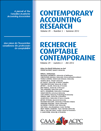
CONTEMPORARY ACCOUNTING RESEARCH
Connecting Academics and Professionals in Accounting ExcellenceCONTEMPORARY ACCOUNTING RESEARCH, published by WILEY, is a premier, peer-reviewed journal based in the United States that has been at the forefront of the accounting field since its inception in 1984. The journal, recognized for its robust Q1 quartile rankings in Accounting, Economics and Econometrics, and Finance for 2023, serves as an invaluable resource for academics and professionals alike, offering insightful research that influences both theory and practice. With an impressive global reach, as indicated by its high ranks in Scopus—#27 in Accounting and #55 in Finance—the journal is dedicated to publishing high-quality studies that tackle contemporary issues in the financial sector. Although not an open-access publication, it maintains a strong commitment to disseminating top-tier research in the discipline. Researchers, professionals, and students looking to stay abreast of the latest developments in accounting and finance will find CONTEMPORARY ACCOUNTING RESEARCH an essential addition to their academic resources.

Annual Review of Financial Economics
Advancing the Frontiers of Financial KnowledgeAnnual Review of Financial Economics, published by Annual Reviews, stands as a pivotal journal in the fields of Economics and Finance, recognized for its rigorous analysis and comprehensive reviews since its inception in 2010. With an impressive impact factor reflected in its Q1 ranking in both Economics and Econometrics and Finance for 2023, this journal serves as an essential resource for researchers, professionals, and students keen on understanding the dynamic interplay of financial theories and practices. The ISSN 1941-1367 and E-ISSN 1941-1375 signal its commitment to accessibility and dissemination of cutting-edge research within the community. Addressing crucial topics from market behavior to economic modeling, each annual volume synthesizes the latest findings and theoretical advancements, thus contributing significantly to the global discourse within financial economics. With its high Scopus rankings, including a finance rank of #75 out of 317, the journal continues to foster a deep understanding of financial systems and their implications, serving as an invaluable tool for anyone engaged in the broader economic landscape.
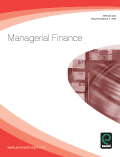
MANAGERIAL FINANCE
Empowering Research in Finance and Management.MANAGERIAL FINANCE is a prestigious academic journal published by Emerald Group Publishing Ltd, focused on the areas of finance, management, and strategy. With an ISSN of 0307-4358 and an E-ISSN of 1758-7743, this journal has carved a niche for itself within the business and financial sectors, achieving a commendable Q2 category ranking across multiple domains, including Business, Management and Accounting, Finance, and Strategy and Management, as of 2023. The journal aims to provide a platform for insightful research and critical analysis while fostering an understanding of contemporary financial practices and theories. With its wide-ranging scope, it serves as a vital resource for researchers, professionals, and students alike, looking to stay abreast of the latest trends and challenges in managerial finance. The editorial board is committed to maintaining academic rigor, ensuring that articles published are of the highest quality and relevance to the field. By bridging the gap between theory and practice, MANAGERIAL FINANCE is an essential reference for anyone involved in financial decision-making and strategic management.
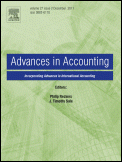
Advances in Accounting
Innovating Accounting through Research ExcellenceAdvances in Accounting, published by Elsevier, is a pivotal academic journal within the fields of accounting and finance, exemplifying a commitment to the dissemination of innovative research and critical analyses. With its ISSN 0882-6110 and E-ISSN 1046-5715, this journal has evolved since its inception in the early 2000s, now offering a platform for scholars and practitioners to explore cutting-edge developments in accounting frameworks and financial strategies. The journal is recognized in the Q3 category for both accounting and finance as of 2023, reflecting its relevance and contribution to these disciplines. Although it currently does not feature an Open Access option, it remains an invaluable resource for researchers seeking to enhance their understanding of financial complexities and accounting methodologies. With its significant Scopus rankings, including #161 in Finance and #102 in Accounting, Advances in Accounting is essential for those keen on keeping abreast of the latest theoretical and practical advancements in the field.
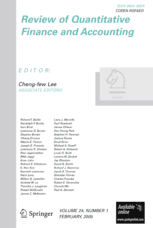
Review of Quantitative Finance and Accounting
Transforming Data into Knowledge in Finance and AccountingThe Review of Quantitative Finance and Accounting, published by Springer, is a distinguished academic journal that has been at the forefront of scholarly discourse since its inception in 1991. With an ISSN of 0924-865X and an E-ISSN of 1573-7179, this journal specializes in the interdisciplinary realms of accounting and finance, particularly emphasizing quantitative methodologies and their applications in real-world scenarios. With an impressive track record reflected in its 2023 rankings, it sits in the Q2 category across key fields such as Accounting, Business Management, and Finance, demonstrating its relevance and influence within these domains. Although it operates without an Open Access option, the journal's content remains vital for researchers, professionals, and students aiming to deepen their understanding of quantitative approaches in finance and accounting contexts. The Review of Quantitative Finance and Accounting stands as an essential resource for advancing knowledge and fostering innovation within these critical disciplines.
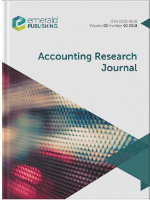
Accounting Research Journal
Shaping the future of accounting through high-quality scholarship.Accounting Research Journal, published by Emerald Group Publishing Ltd, is a leading platform for the dissemination of high-quality research in the fields of accounting and finance. With an ISSN of 1030-9616 and an E-ISSN of 1839-5465, this journal is dedicated to advancing the scholarship and practice of accounting, recognizing its critical role in economic and financial decision-making. As of 2023, it is classified in the Q3 category for both Accounting and Finance, reflecting its notable standing within the academic community, with Scopus rankings placing it in the top 25% of journals in these fields. The Accounting Research Journal aims to engage researchers, professionals, and students by publishing original research articles, critical reviews, and insightful papers that challenge conventional thinking and inspire innovative practices. Given its converged years from 2005 to 2024, the journal serves as a vital resource for contemporary research and trends in accounting and finance, fostering a collaborative environment for knowledge sharing in the United Kingdom and beyond.
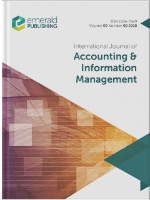
International Journal of Accounting and Information Management
Innovating Financial Insights through Rigorous ResearchThe International Journal of Accounting and Information Management, published by Emerald Group Publishing Ltd, is a premier academic journal that has made significant contributions to the fields of accounting, economics, and information management since its inaugural issue in 2007. With an impact factor that places it in the Q1 category for both accounting and economics, it provides a platform for innovative research that addresses contemporary challenges facing these disciplines. The journal is particularly esteemed for its rigorous peer-review process and its commitment to the dissemination of research that integrates the nuances of financial reporting and information systems. Hailing from the United Kingdom, the journal has an expansive global reach, with contributions that delve into the intersections of technology, management, and finance. Researchers, professionals, and students alike benefit from the journal’s high-ranking status, evidenced by its placement in the 96th percentile within general economics and finance on Scopus, making it an essential resource for those looking to advance their knowledge and engage with cutting-edge scholarship.
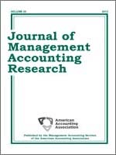
Journal of Management Accounting Research
Pioneering research that shapes the future of management accounting.The Journal of Management Accounting Research is a leading scholarly publication dedicated to advancing the field of management accounting. Published by the American Accounting Association in the United States, this journal focuses on original research that bridges theoretical and practical aspects of management accounting, guiding both researchers and practitioners in the financial landscape. With its scopus rankings placing it in the Q2 quartile for both Accounting and Business and International Management, it stands as a significant resource for scholars aiming to influence the contemporary discourse in these disciplines. Spanning the years from 2009 to 2024, the journal continues to be an essential platform for disseminating knowledge and fostering discussion among academics, professionals, and students in the domain of management accounting.